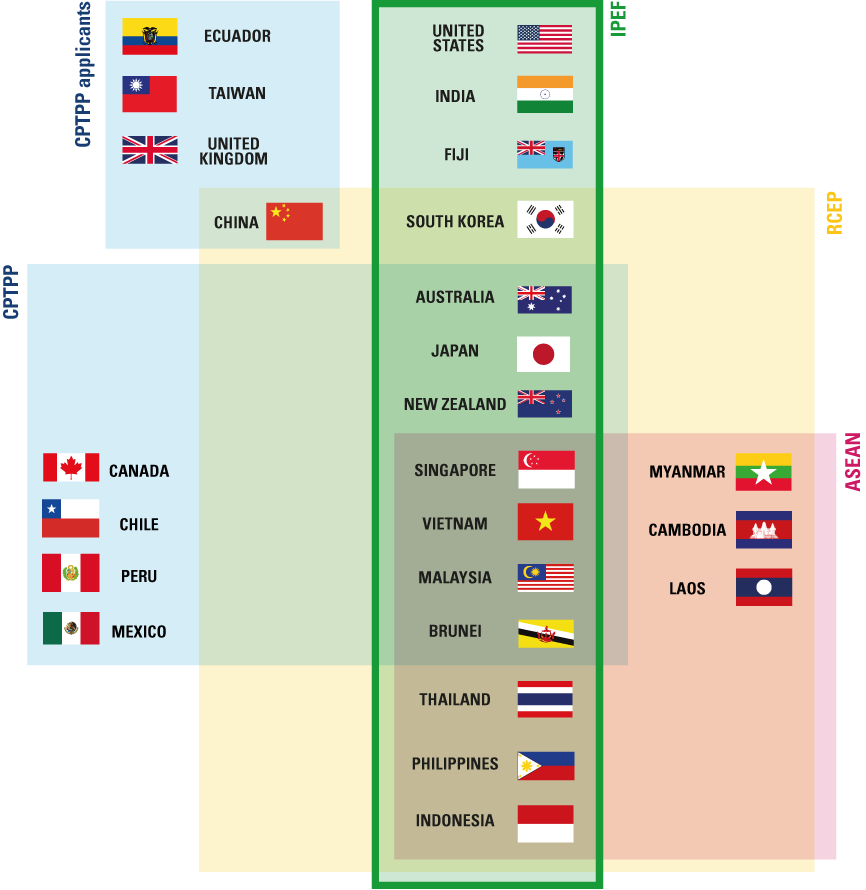IPEF Ministerial Meeting 2024 | 10 Jun 2024
Why in News?
Recently, India participated in the Indo-Pacific Economic Framework for Prosperity (IPEF) Ministerial Meeting, held in Singapore on 6th June 024, showcasing the significant strides made in fostering economic engagement among partner countries in the Indo-Pacific region.
What are the Key Highlights of the Meeting?
- IPEF members signed 3 agreements focused on the Clean Economy, Fair Economy, and the overarching IPEF Agreement.
- India did not formally sign these agreements as the domestic approval process is still underway.
- Clean Economy Agreement:
-
It aims to accelerate efforts towards energy security, climate resilience, and reducing GHG emissions.
-
India has taken a leading role in launching a new collaborative effort called a "Cooperative Work Programme" (CWP) that is focused on recovering valuable resources from electronic waste, also known as e-waste urban mining.
-
-
IPEF Catalytic Capital Fund:
-
The fund was launched to support clean economy infrastructure projects in IPEF emerging and upper-middle-income economies.
- The founding supporters such as Australia, Japan, Korea, and the US have provided USD 33 million as an initial grant funding to catalyse USD 3.3 billion in private investment.
-
- Fair Economy Agreement:
-
It aims to create a more transparent and predictable business environment, promote fair competition, and enhance efforts against corruption.
- India highlighted a training program in Digital Forensics & System-Driven Risk Analysis that it will offer to other IPEF partners.
-
- IPEF Upskilling Initiative:
- It provides digital skills training, primarily to women and girls, in IPEF partner countries.
- In the last 2 years, it has provided 10.9 million upskilling opportunities, of which 4 million were in India.
What is IPEF?
- About:
- IPEF was launched on 23rd May 2022 at Tokyo, Japan, comprising 14 countries The IPEF seeks to strengthen economic engagement and cooperation among partner countries with the goal of advancing growth, economic stability and prosperity in the region.
- Members:
- Australia, Brunei, Fiji, India, Indonesia, Japan, South Korea, Malaysia, New Zealand, Philippines, Singapore, Thailand, United States, and Vietnam.
- These 14 IPEF partners represent 40% of global GDP and 28% of global goods and services trade.
- Pillars:
- The IPEF is built on 4 main pillars: (I) fair and resilient trade, (II)supply chain resilience, (III) clean economy (renewable energy and reduction of carbon emissions), and (IV) fair economy (tax and anti-corruption policies).
- India has joined Pillars II to IV of IPEF while it has an observer status in Pillar I.
- Fair and Resilient Trade (Pillar I): Aims to promote economic growth, peace, and prosperity in the region.
- Supply-Chain Resilience (Pillar II): Seeks to make supply chains more resilient, robust, and well-integrated.
- Focuses on improving logistics, connectivity, and investments in critical sectors.
- Aims to enhance worker roles through upskilling and reskilling initiatives.
- Clean Economy (Pillar III): Aims to advance cooperation on clean energy and climate-friendly technologies.
- Focuses on research, development, commercialisation, and deployment of clean energy.
- Encourages investment in climate-related projects in the Indo-Pacific region.
- Fair Economy (Pillar IV): Focuses on implementing effective anti-corruption and tax measures.
- Highlights India's strong steps in improving legislative and administrative frameworks to combat corruption.

